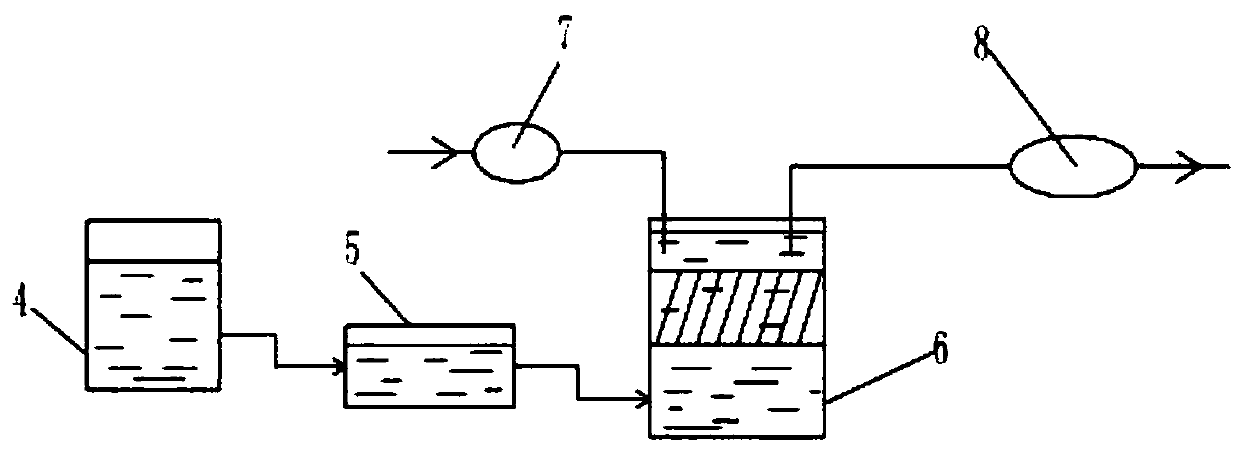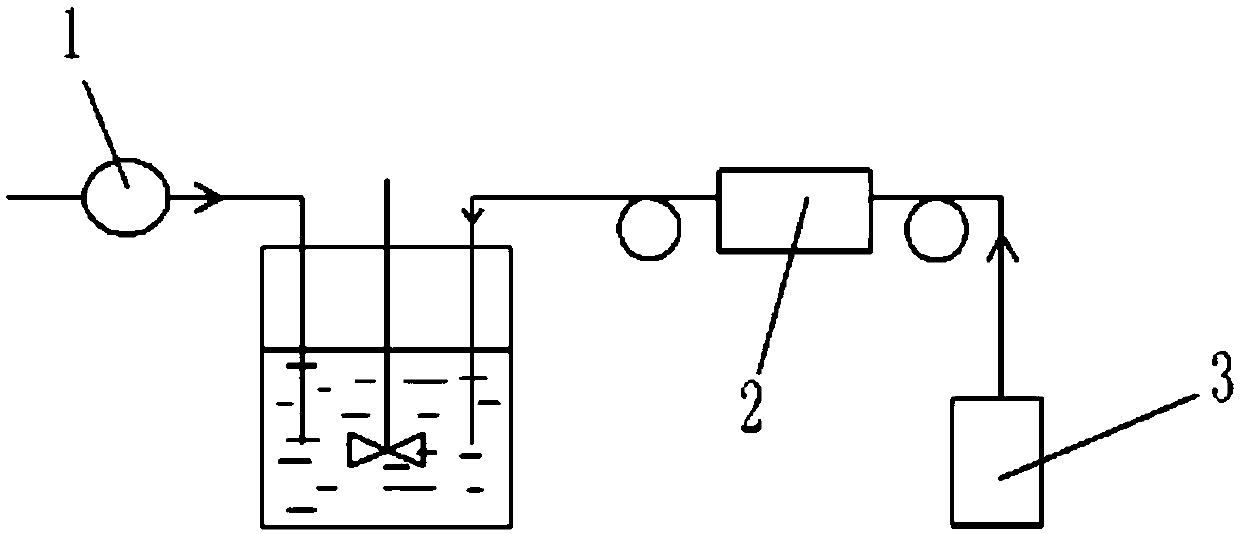Method for removing diclofenac in sewage in strengthened manner on basis of enriched nitrifying bacteria
A technology of nitrifying bacteria and diclofenac, applied in chemical instruments and methods, oxidized water/sewage treatment, sterilization/microdynamic water/sewage treatment, etc., to achieve the effects of high stability, simple equipment and strong adaptability
- Summary
- Abstract
- Description
- Claims
- Application Information
AI Technical Summary
Problems solved by technology
Method used
Image
Examples
Embodiment 1
[0030] A method based on enriching nitrifying bacteria to strengthen the removal of diclofenac in sewage, comprising the following steps:
[0031] 1) Domesticate and enrich the nitrifying bacteria by gradually increasing the ammonia nitrogen load and gradually reducing the organic carbon load in the MBR. The enriched nitrifying bacteria are domesticated for a period of three months, and then the activated sludge is mixed with the enriched nitrifying bacteria to obtain Enrichment of domesticated nitrifying sludge;
[0032] 2) Make the sewage flow to the secondary settling tank, carry out solid-liquid separation, and separate to obtain supernatant and sediment;
[0033] 3) Pump the supernatant separated from step 1) into the MBR that enriches and domesticates the nitrification sludge. In the MBR, the concentration of the nitrification sludge is controlled to be 1000 mg / L, and the sodium bicarbonate for pH adjustment is 500 mg / L. Through real-time pH Measure and add sodium bicar...
experiment example 2
[0036] A method based on enriching nitrifying bacteria to strengthen the removal of diclofenac in sewage, comprising the following steps:
[0037] 1) Domesticate and enrich the nitrifying bacteria by gradually increasing the ammonia nitrogen load and gradually reducing the organic carbon load in the MBR. The enriched nitrifying bacteria are domesticated for a period of three months, and then the activated sludge is mixed with the enriched nitrifying bacteria to obtain Enrichment of domesticated nitrifying sludge;
[0038] 2) Make the sewage flow to the secondary settling tank, carry out solid-liquid separation, and separate to obtain supernatant and sediment;
[0039]3) Pump the supernatant separated from step 1) into the MBR that enriches and domesticates the nitrification sludge. In the MBR, the concentration of the nitrification sludge is controlled to be 1000 mg / L, and the sodium bicarbonate for pH adjustment is 500 mg / L. Through real-time pH Measure and add sodium bicarb...
Embodiment 3
[0042] A method based on enriching nitrifying bacteria to strengthen the removal of diclofenac in sewage, comprising the following steps:
[0043] 1) Domesticate and enrich the nitrifying bacteria by gradually increasing the ammonia nitrogen load and gradually reducing the organic carbon load in the MBR. The enriched nitrifying bacteria are domesticated for a period of three months, and then the activated sludge is mixed with the enriched nitrifying bacteria to obtain Enrichment of domesticated nitrifying sludge;
[0044] 2) Make the sewage flow to the secondary settling tank, carry out solid-liquid separation, and separate to obtain supernatant and sediment;
[0045] 3) Pump the supernatant separated from step 1) into the MBR that enriches and domesticates the nitrification sludge. In the MBR, the concentration of the nitrification sludge is controlled to be 1000 mg / L, and the sodium bicarbonate for pH adjustment is 500 mg / L. Through real-time pH Measure and add sodium bicar...
PUM
 Login to View More
Login to View More Abstract
Description
Claims
Application Information
 Login to View More
Login to View More - R&D
- Intellectual Property
- Life Sciences
- Materials
- Tech Scout
- Unparalleled Data Quality
- Higher Quality Content
- 60% Fewer Hallucinations
Browse by: Latest US Patents, China's latest patents, Technical Efficacy Thesaurus, Application Domain, Technology Topic, Popular Technical Reports.
© 2025 PatSnap. All rights reserved.Legal|Privacy policy|Modern Slavery Act Transparency Statement|Sitemap|About US| Contact US: help@patsnap.com



